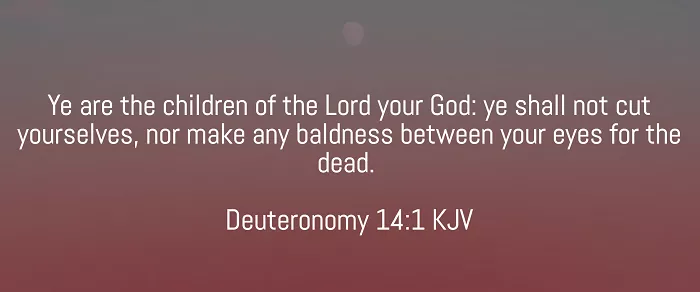The book of Deuteronomy, the fifth book of the Pentateuch, is a collection of speeches delivered by Moses to the Israelites before they enter the Promised Land. Deuteronomy, which means “second law,” reiterates the laws given to the Israelites and serves as a reminder of their covenant with God. It is a crucial text for understanding the theological and ethical foundations of ancient Israelite society.
Tattoos in the Ancient Near East
Tattoos were not uncommon in the ancient Near East, where Israel was situated. Various neighboring cultures, including the Egyptians and Canaanites, practiced tattooing for different reasons, including religious rituals, social status symbols, and marks of ownership. However, the Israelites were called to be distinct from their neighbors in their worship and practices, a theme that is central to the book of Deuteronomy.
Absence of Direct Reference
It is notable that Deuteronomy does not explicitly mention tattoos. The book is extensive in its legal and moral instructions, yet it does not provide a direct prohibition or endorsement of tattoos. This absence might lead to the question: Why does Deuteronomy remain silent on this issue?
Indirect Implications
Although Deuteronomy does not explicitly address tattoos, it contains several laws and principles that might indirectly relate to the practice of tattooing. These laws are grounded in the broader theological and ethical framework of the Israelite covenant community.
Holiness and Distinction
One of the central themes in Deuteronomy is the call to holiness and distinction from other nations. Deuteronomy 14:2 states, “For you are a people holy to the LORD your God, and the LORD has chosen you to be a people for his treasured possession, out of all the peoples who are on the face of the earth.” This call to holiness and separation could imply a prohibition against practices common among neighboring peoples, including tattooing, if those practices were associated with pagan worship or other unholy activities.
Body as God’s Creation
Deuteronomy, along with the rest of the Torah, emphasizes the sanctity of the human body as God’s creation. While the text does not specifically address body modifications like tattoos, the underlying principle of respecting and honoring one’s body can be inferred. Deuteronomy 22:5, which prohibits cross-dressing, reflects a concern for maintaining the natural distinctions established by God. This principle might extend to other forms of altering the body.
Leviticus and Its Relevance
To understand the broader biblical context of tattoos, it is essential to consider Leviticus 19:28, which states, “You shall not make any cuts on your body for the dead or tattoo yourselves: I am the LORD.” While this prohibition is found in Leviticus, not Deuteronomy, it reflects the same covenantal principles of holiness and separation. The Israelites were to avoid practices associated with mourning rituals and pagan worship.
See Also: What Does the Bible Say About Tattoos in Leviticus?
Covenantal Identity
Deuteronomy emphasizes the covenantal identity of the Israelites. They are to live according to God’s laws, which set them apart as His chosen people. This identity encompasses all aspects of life, including personal appearance and body modifications. Although tattoos are not directly mentioned, any practice that might compromise this covenantal identity could be viewed with caution.
Interpretations by Jewish and Christian Traditions
Jewish and Christian traditions have interpreted the laws of Deuteronomy, including the broader biblical injunctions, in various ways concerning tattoos. Rabbinic Judaism has generally upheld the prohibition of tattoos based on Leviticus 19:28, interpreting it as a reflection of the principles found in Deuteronomy. Similarly, many Christian denominations have historically discouraged tattoos, viewing them as inconsistent with the call to holiness and distinction.
Modern Perspectives
In contemporary times, attitudes toward tattoos have evolved significantly. Many Christians and Jews now see tattoos as a personal choice that does not necessarily conflict with their faith. Some view tattoos as a form of self-expression or as a means of displaying religious symbols and beliefs. This shift reflects broader cultural changes and the diverse ways in which individuals understand their relationship with their bodies and their faith.
Theological Reflections
From a theological perspective, the absence of a direct prohibition in Deuteronomy allows for a range of interpretations. Some might argue that since tattoos are not explicitly forbidden, they are permissible as long as they do not contradict the core principles of holiness, respect for the body, and covenantal identity. Others might contend that the spirit of Deuteronomy’s laws, which emphasize separation from pagan practices and maintaining bodily integrity, implies a cautious approach to tattoos.
Ethical Considerations
Ethically, the decision to get a tattoo can be evaluated in light of Deuteronomy’s broader principles. Factors such as the intention behind the tattoo, the content of the tattoo, and its potential impact on one’s witness as a member of the covenant community should be considered. Tattoos that glorify God, reflect biblical themes, or serve as reminders of one’s faith might be viewed more favorably than those that could be seen as frivolous or contrary to Christian and Jewish values.
Conclusion
Deuteronomy does not explicitly address the issue of tattoos, leaving room for interpretation and application within the broader framework of biblical ethics and theology. The principles of holiness, respect for the body, and covenantal identity found in Deuteronomy can guide individuals in making thoughtful and informed decisions about tattoos. As with many aspects of faith and practice, the decision to get a tattoo should be approached with prayerful consideration, seeking to honor God and reflect one’s commitment to living according to His word.

